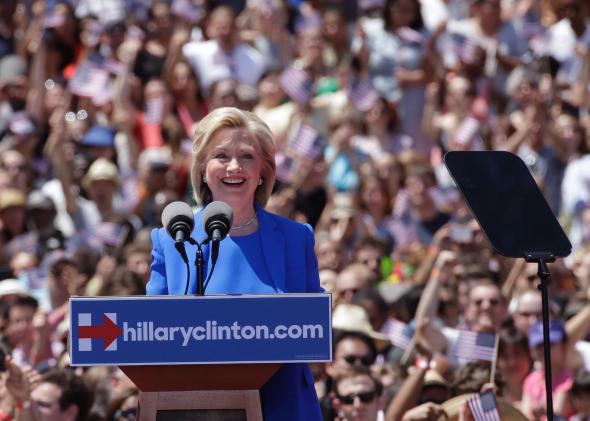On Bathroom Breaks and Republican Recognition of Powerful Women
March Issue: Social Justice

Hilary Clinton: Democratic Presidential Candidate
Do you care about how long it takes for President Obama to go the bathroom? Didn’t think so. So why then, did people care about this same topic for Hillary Clinton?
A few months ago, during a commercial break at a Democratic Debate, Hillary Clinton did what every American does on a daily basis: she went to the bathroom. Unfortunately for her, she wasn’t back in time and she had to awkwardly walk back to her position at the podium and resume the debate. As awkward as this might have been for Hillary Clinton, clearly awkward is all it is, nothing more. Yet, this little bathroom break exploded across pundit commentary and internet discussions alike. Donald Trump, the one person who you would expect to act like an immature thirteen-year-old, commented that it was “too disgusting” to talk about.
So why do I bring this up? It’s not to provide an explanation for the event, (but if you would like to hear an explanation it’s this: the women’s bathroom in the gymnasium style venue was a timed minute and forty-five seconds walk away from the debate stage, and with a five minute commercial break, it just wasn’t enough time), but to bring up the topic of the treatment of women this election season.
Miss Representation, a documentary about the mainstream media’s portrayal of women, was inspired by the sexist double standards that surrounded the 2008 presidential election and the media coverage of Hillary Clinton. Comments on Clinton’s looks, obsession over whether she’s wearing glasses or makeup, and comparisons to Clinton as a “stale, musty” car are downright unacceptable. It is this lack of respect towards female candidates that dominates the utter lack of respect directed towards women’s issues such as funding of Planned Parenthood, equal pay for equal work, paid maternity leave, and more.
One of these issues, while possibly not as high up on the list as equal pay for equal work, is placing a woman on the $10 bill. In 2020, the Treasury Department plans on replacing Alexander Hamilton on the $10 bill with a woman’s face. It is important to note that this woman will not completely erase Alexander Hamilton, but instead be an accompaniment edition. The qualifications for who this woman will be very simple: she must be deceased, she must have been American, and she must have promoted democracy. Thinking of five women who fit this requirement off the top of your head, hopefully, is not very difficult. Unfortunately, it was for, many, if not all of the GOP candidates.
Back in September, when the debate scene was still a novelty, and people naively tuned in to see if Donald Trump would say something racist and finally disqualify himself, the Republican candidates were asked a question that was supposed to be lighthearted. Accompanied with the question of what would your Secret Service nickname be? (my personal favorites stuck between the tough choices of Donald Trump’s “Humble” and Rand Paul’s “Justice Never Sleeps”), came the question of who they would like to see on the $10 bill. Each candidate save five, floundered when faced with a question not memorized and prepared.
Among the four acceptable answers were Abigail Adams, Rosa Parks, Clara Barton, and Susan B. Anthony. While these were all qualifiable answers, it is upsetting to me that these were the only acceptable women that could be named. John Kaisch chose Mother Teresa, but unfortunately this would not work because she is not American. Ben Carson, Donald Trump, and Mike Huckabee all chose family members, but alas these women do not meet the requirements because they have not done anything to promote democracy, and they are not dead.While it is nice that candidates respect their family members, nice is all that it is. I can guarantee that if this question was opened up to what man should replace Alexander Hamilton, the answers would not have been “my brother” or “my father” but rather political icons and Republican heros such as Ronald Reagan, John Adams, and more.
Personally my favorite answer came from Jeb Bush, who after stating that this would never happen, chose Margaret Thatcher, the former British Prime Minister. What makes me madder than the fact that he chose a British woman, was that he blatantly decided to not try when making his decision, deeming this issue unimportant and not worth his time.
The most deplorable answer came from the lone female candidate in the crowded Republican field, Carly Fiorina. When asked who she would choose, she chose nobody, stating “I think honestly it’s a gesture. I don’t think it helps to change our history.” This answer was particularly upsetting because instead of taking the opportunity to champion herself as someone who would stand up for women, she took this opportunity to try to distance herself from the fact that she is a woman. No, this transition would not change our history, but rather highlight those that haven’t been in the spotlight for the past two-hundred years. Yes, this transition would be a “gesture,” but this is a gesture that holds nothing but positive connotations. It is a gesture that says to the American population as a whole that America values women and values their contributions to democracy thus far. Having a woman on the $10 bill shows that women are respected in American society, and recognizes that women have a place in shaping American history.
So this election season, try to focus on pure politics and policy decisions, not looks and gender. Avoid calling Clinton “aggressive” or “pushy” because she fights back against criticism or is passionate about her positions. Because even though women are progressing in the political sphere, it shouldn’t matter why it took Hillary Clinton a few extra minutes to go to the bathroom.






































